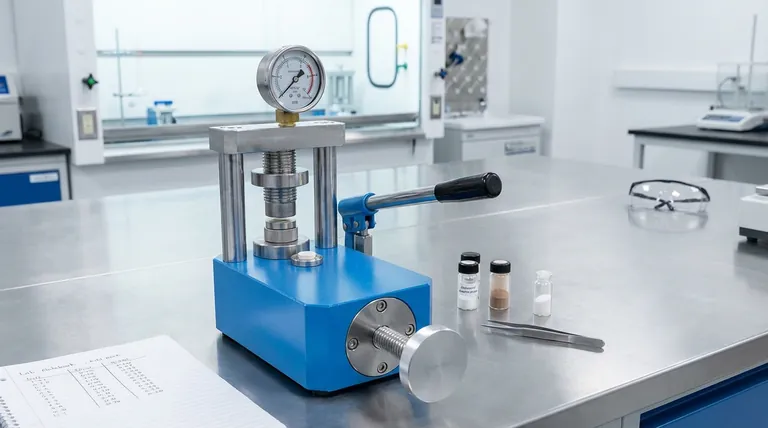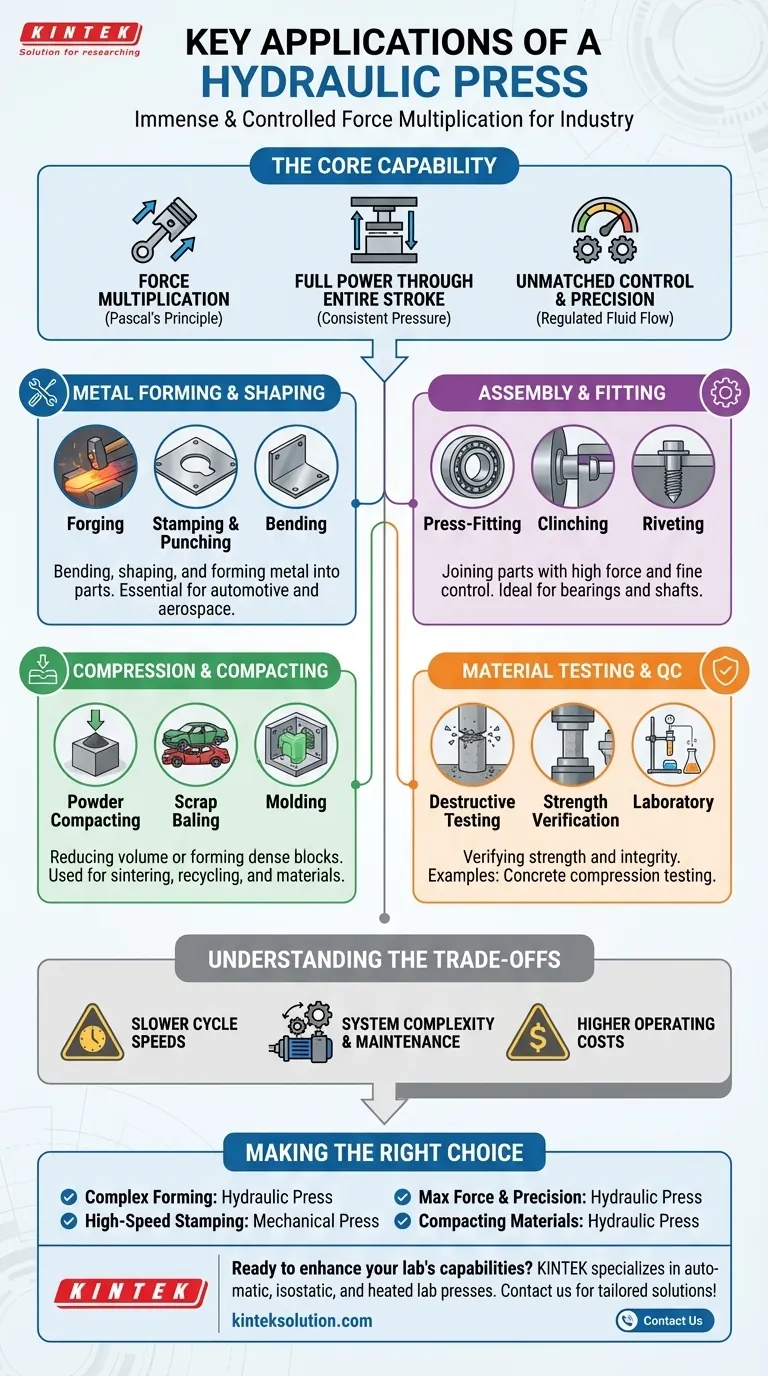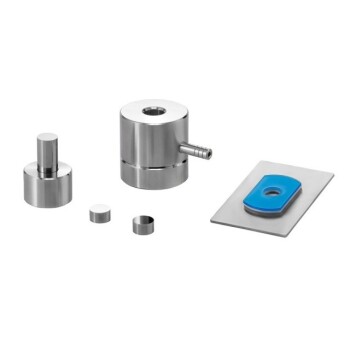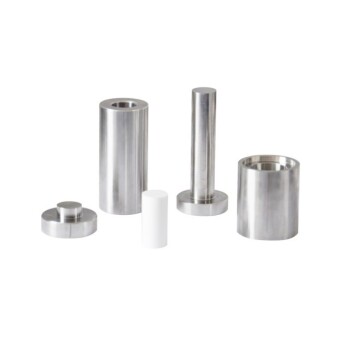In essence, a hydraulic press is a tool of immense and controllable force multiplication. It is used across nearly every heavy industry for tasks that require shaping, compressing, or assembling materials with precision. Key applications include forging and stamping metal parts for the automotive and aerospace sectors, compacting powders into solid forms like ceramics, press-fitting components together, and testing the structural strength of materials like concrete.
A hydraulic press is not just for crushing things. Its true value lies in its ability to deliver a massive, consistent, and highly controlled force over the entire length of its stroke, making it uniquely versatile for processes that demand both power and precision.

The Core Capability: Immense and Controlled Force
To understand the applications, you must first understand the core principle. A hydraulic press uses a fluid to transmit and multiply force, a concept known as Pascal's Principle. This provides unique operational advantages.
The Principle of Force Multiplication
A small amount of force applied to a small piston in a sealed hydraulic system generates an exponentially larger amount of force on a larger piston. This is how a relatively compact machine can generate thousands of tons of pressure.
This fundamental principle makes it the go-to solution for any task requiring force that would be impractical for mechanical or manual systems.
Full Power Through the Entire Stroke
Unlike a mechanical press that only delivers maximum force at the bottom of its stroke, a hydraulic press can deliver its full rated tonnage at any point.
This is critical for applications like deep drawing, where consistent pressure is needed to form a sheet of metal into a deep shape without tearing or wrinkling it.
Unmatched Control and Precision
The flow of hydraulic fluid can be precisely regulated, giving the operator exact control over the press's speed, pressure, and position. This level of control is essential for delicate assembly operations or for creating parts with very tight tolerances.
Key Industrial Applications
The unique capabilities of a hydraulic press lend it to a wide range of industrial processes, which can be grouped into a few key categories.
Metal Forming and Shaping
This is the most common application. The press is used to bend, shape, and form metal into finished parts or stock shapes.
Specific processes include:
- Forging: Shaping metal by localized compressive forces.
- Stamping & Punching: Cutting or stamping shapes out of sheet metal, common in auto body panel production.
- Bending: Creating precise angles in metal plates or beams for construction and manufacturing.
Compression and Compacting
The sustained, high pressure of a hydraulic press is ideal for reducing the volume of materials or forming them into a dense, solid block.
This is used for:
- Powder Compacting: Compressing metallic or ceramic powders into solid forms for processes like sintering.
- Scrap Baling: Crushing scrap metal, cars, and other materials into dense, manageable bales for recycling.
- Molding: Forming materials like plastics, rubber, and composites into desired shapes using a mold.
Assembly and Fitting
The high force and fine control of a hydraulic press make it perfect for joining parts that require an interference fit.
The most common use is press-fitting bearings, shafts, and bushings into housings without causing damage. It is also used for clinching and riveting operations.
Material Testing and Quality Control
In laboratory and quality control settings, a hydraulic press is used to perform destructive testing to verify the strength and integrity of materials and components.
A prime example is concrete compression testing, where a sample cylinder of concrete is crushed to determine its load-bearing capacity.
Understanding the Trade-offs
While powerful and versatile, a hydraulic press is not the solution for every problem. Understanding its limitations is key to making an informed decision.
Slower Cycle Speeds
Generally, hydraulic presses have slower cycle times compared to their mechanical counterparts. The time it takes to build and release hydraulic pressure makes them less suitable for high-speed, high-volume production lines where thousands of parts are needed per hour.
System Complexity and Maintenance
Hydraulic systems involve pumps, valves, hoses, seals, and hydraulic fluid. This complexity introduces more potential points of failure, such as fluid leaks, and often requires more specialized maintenance than simpler mechanical systems.
Higher Operating Costs for Some Tasks
While the initial cost can vary, the continuous operation of the hydraulic pump can lead to higher energy consumption compared to a mechanical press, which uses the momentum of a flywheel.
Making the Right Choice for Your Goal
The best technology depends entirely on your project's primary objective.
- If your primary focus is forming complex or deep-drawn parts: A hydraulic press is the superior choice due to its consistent force throughout the stroke.
- If your primary focus is maximum force and precision control: For assembly, material testing, or forging, the power and control of a hydraulic press are unmatched.
- If your primary focus is high-speed, repetitive stamping: A mechanical press is likely a better fit due to its faster cycle speeds.
- If your primary focus is compacting materials like scrap or powders: The sustained, immense pressure of a hydraulic press is necessary to achieve the required density.
Understanding these core capabilities and trade-offs empowers you to select not just a tool, but the right process to achieve your engineering goal.
Summary Table:
| Application Category | Key Processes | Key Benefits |
|---|---|---|
| Metal Forming and Shaping | Forging, Stamping, Bending | Consistent force, precision shaping |
| Compression and Compacting | Powder Compacting, Scrap Baling | High pressure for dense, solid forms |
| Assembly and Fitting | Press-fitting bearings, shafts | Fine control, damage-free joining |
| Material Testing and Quality Control | Concrete compression testing | Accurate strength verification |
Ready to enhance your laboratory's capabilities with reliable hydraulic press solutions? KINTEK specializes in lab press machines, including automatic lab presses, isostatic presses, and heated lab presses, designed to meet your precise needs in metal forming, powder compacting, and material testing. Our equipment delivers unmatched force control and durability, ensuring superior results for your projects. Contact us today to discuss how we can support your goals and provide tailored solutions!
Visual Guide

Related Products
- Laboratory Hydraulic Press 2T Lab Pellet Press for KBR FTIR
- Automatic Laboratory Hydraulic Press for XRF and KBR Pellet Pressing
- Automatic Heated Hydraulic Press Machine with Hot Plates for Laboratory
- Laboratory Hydraulic Press Lab Pellet Press Button Battery Press
- Automatic Laboratory Hydraulic Press Lab Pellet Press Machine
People Also Ask
- Why must a laboratory hydraulic press be used for pelletizing samples for FTIR? Achieve Precision in Spectral Data
- What role does a laboratory hydraulic press play in carbonate powder prep? Optimize Your Sample Analysis
- Why is sample uniformity critical when using a laboratory hydraulic press for humic acid KBr pellets? Achieve FTIR Accuracy
- What role does a high-pressure laboratory hydraulic press play in KBr pellet preparation? Optimize FTIR Accuracy
- How do hydraulic press machines ensure precision and consistency in pressure application? Achieve Reliable Force Control for Your Lab



















